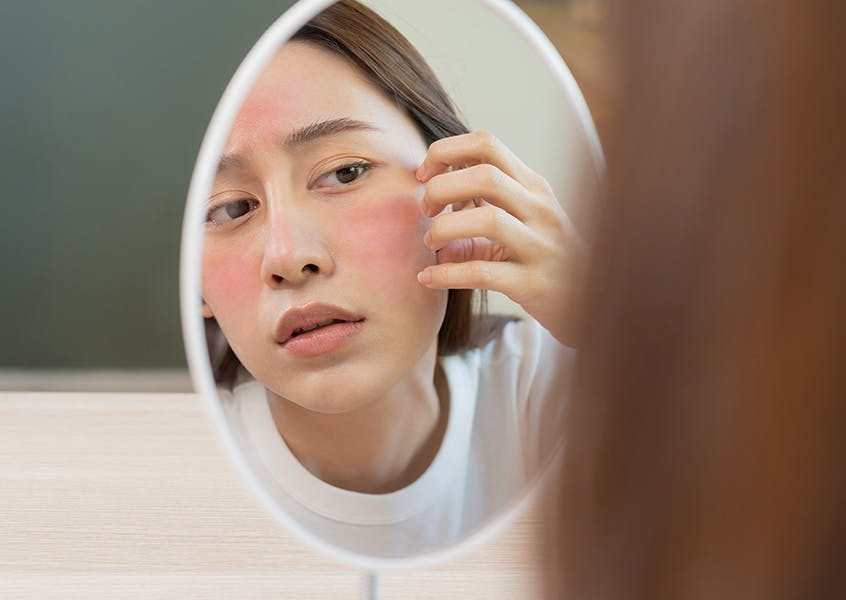If you're someone who enjoys partying and consuming alcohol, it's likely that you're already aware of whether you have alcohol intolerance and to what extent it affects you. However, if you fall into the category of infrequent drinkers, you may have doubts about whether you have alcohol intolerance when experiencing redness after consuming alcohol. Fortunately, this article provides answers to your questions.
What are the symptoms of alcohol intolerance?
Alcohol intolerance is a genetic condition that causes the body's immune system to react negatively to alcohol, resulting in severe symptoms such as rashes, swelling on the body and face, hives, abdominal pain, dizziness, and even a severe acute allergy that can cause shortness of breath, nausea, vomiting, and weakened pulse, which can potentially lead to death. Although rare, alcohol intolerance is often the underlying cause for individuals who experience frequent flushing after consuming alcohol.
This condition occurs due to a genetic abnormality that affects the ALDH2 enzyme, responsible for metabolizing alcohol in the liver. Individuals with alcohol intolerance have low levels or a malfunctioning ALDH2 enzyme, leading to the accumulation of toxins in the body, causing various symptoms such as redness in the body, face, and eyes, rashes, dizziness, rapid heartbeat, vomiting, and more. As the initial symptoms may resemble other conditions, many people wrongly assume they have alcohol intolerance.
Alcohol intolerance is an inherited condition that can vary in severity from person to person, and unfortunately, there is no known cure. However, the symptoms can be managed with the use of antihistamines, which help to relieve the discomfort experienced by individuals with the condition.
Five conditions that people commonly mistake for alcohol intolerance
Alcohol intolerance is a rare condition, and it's not uncommon for people to mistake it for other ailments that present similar symptoms. It's crucial to differentiate between alcohol intolerance and other conditions, such as allergies or specific diseases, as they require different treatment approaches. Therefore, a thorough evaluation is necessary to diagnose alcohol intolerance accurately.
1. Food allergies may not always be caused by alcohol but some alcoholic beverages contain ingredients like malt, barley, grapes, etc., which can trigger an allergic reaction in sensitive individuals.
2. Certain drugs such as Elidel and Protopic used for treating dermatitis can cause drug allergies in some people.
3. Rosacea Dermatitis and certain other diseases can cause redness in response to alcohol consumption, and the intensity of the reaction can increase over time.
4. Sulfite intolerance can occur due to the presence of sulfites, which are preservatives added to alcoholic drinks to extend their shelf life. Sulfites can trigger allergic reactions in some people.
5. Histamine intolerance may occur when the hormone Diamine Oxidase is not functioning properly. Exposure to histamine found in alcoholic beverages can cause symptoms similar to alcohol intolerance due to an allergic reaction in some individuals.
How to cope with alcohol intolerance
If you experience an allergic reaction to alcohol, taking an antihistamine can help alleviate symptoms such as rash and a stuffy nose. However, if the reaction is severe, it is essential to administer epinephrine (adrenaline) immediately and seek medical attention at a hospital for further evaluation and treatment.
What to do after treating alcohol intolerance
Once diagnosed with alcohol intolerance, it is crucial to make lifestyle changes to prevent future episodes. If the condition runs in the family, it is best to avoid all types of alcoholic beverages altogether to reduce the risk of severe allergic reactions that could be fatal. For individuals experiencing mild symptoms triggered by specific ingredients found in certain alcoholic drinks, it is advisable to switch to alternative beverages that do not contain allergenic substances. This can help prevent the onset of symptoms and ensure a safer drinking experience.
While alcohol allergies are rare, it is essential to exercise caution when attending social events to ensure your safety and well-being. You can undergo skin prick tests and blood tests to identify allergenic substances and take preventive measures accordingly. For Krungthai-AXA Life Insurance customers interested in healthcare, there are other informative health articles available at https://www.krungthai-axa.co.th/th/health-advisories These resources can offer valuable insights and guidance on maintaining good health and preventing allergies.
References
· Pobpad website
http://bit.ly/3Hdi98a
http://bit.ly/3WIM0v3
· Rattinan Medical Center
https://www.rattinan.com/alcohol/


